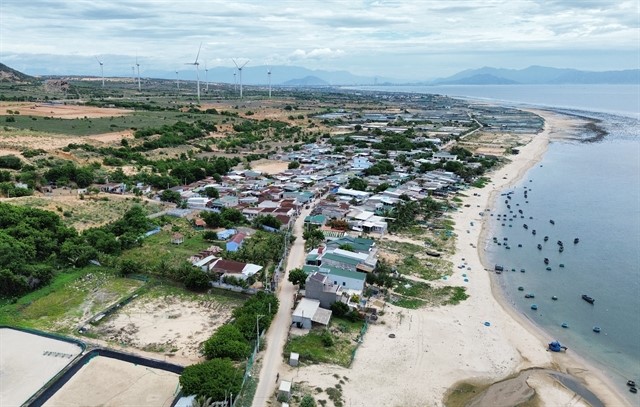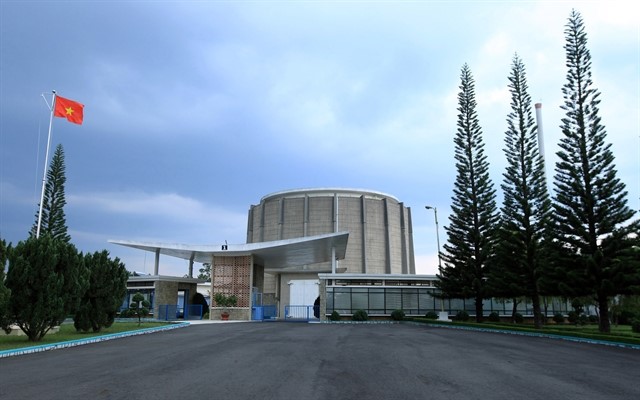Vietnamese law-markers have approved the plan to resume the nuclear power project in the south – central province of Ninh Thuận after eight years of pause in an effort to ensure energy security while meeting Net Zero goal.

After an eight-year hiatus, Vietnamese lawmakers have approved a plan to restart the Ninh Thuận nuclear power project, reaffirming the country’s commitment to ensuring energy security and achieving its Net Zero targets by 2050.
The National Assembly (NA) on November 30 passed a resolution, allowing the Government to allocate resources and amend relevant laws, including the Law on Atomic Energy, to facilitate the project’s revival.
The NA resolution realises a November 25 resolution by the Việt Nam Communist Party Central Committee, which calls for resuming the study of nuclear energy development and restarting the Ninh Thuận nuclear power project.
The amended Law on Electricity, passed on the same day by the NA, underscores the importance of aligning nuclear power development with the broader national electricity plan. This concerted effort aims to ensure a steady, long-term supply of energy while diversifying Việt Nam’s energy portfolio.
Under the new legislation, the Government will maintain its monopoly on the construction and operation of nuclear power plants, reflecting the criticalness of nuclear energy in Việt Nam’s strategy for energy security and sustainability.
Deputy Prime Minister Nguyễn Hoà Bình on November 27 presented the Government’s proposal, highlighting "nuclear power’s growing importance in global efforts to combat climate change and reduce greenhouse gas emissions".
By the end of August 2024, there were 415 operational nuclear reactors worldwide with a combined capacity of 373,735 MW. An additional 62 reactors were under construction with a total capacity of approximately 64,970MW, Bình said.
He added that nuclear power was now a key focus for 32 countries with operating plants and 20 others exploring its potential to meet growing energy demands while fulfilling climate commitments.
Rising energy demands

Việt Nam faces mounting electricity demands driven by rapid economic growth and industrialisation. The national power system has a total capacity of about 80GW currently, but by 2030 projections indicate an additional 70GW will be required. By 2050, capacity needs could soar to between 400 and 500GW.
“The development of nuclear power will not only diversify energy sources and ensure energy security but also support environmental protection,” Bình said.
"Nuclear power offers competitive production costs compared to other energy sources. Việt Nam is committed to adopting modern technologies to ensure safety and efficiency, he added.
Việt Nam’s ambition to transform into a digital and green economy is adding pressure on the nation’s energy infrastructure.
Minister of Information and Communications Nguyễn Mạnh Hùng highlighted the increasing importance of digital infrastructure, saying, “The next phase of development will rely heavily on data and data processing, which requires substantial electricity supply.”
The NA also approved an ambitious US$67-billion North-South high-speed railway project, powered entirely by electricity. According to the Ministry of Transport, this project will consume 1.2 billion kWh between 2036 and 2040, rising to 6.03 billion kWh by 2050.
Urban metro systems, identified as key solutions for sustainable transport in major cities, and electric vehicle (EV) adoption goals – targeting 100 per cent electric motorbikes and 70 per cent electric cars by 2050 – will further amplify electricity demand.
The electricity required to support these green transport initiatives alone is expected to reach 71.87 billion kWh by 2050, roughly ten times the capacity of the Hòa Bình hydropower plant.
Lê Anh Tuấn, chairman of the University Council at Hà Nội University of Science and Technology, said that without significant improvements to the national electricity grid, Việt Nam might struggle to meet its green transport and industrial ambitions.

Nuclear energy offers unparalleled stability and efficiency compared to other energy sources, according to energy expert Đào Nhật Đình.
“While a 1,000MW nuclear plant can achieve up to 92 per cent of its designed capacity, a gas-fired plant operates at 56 per cent, a wind farm at 35.4 per cent, and a solar power plant at 24.9 per cent,” Đình said.
Unlike renewable sources such as solar and wind, which are weather-dependent, nuclear power provides a consistent energy output. This makes it a critical option for meeting Việt Nam’s baseload electricity needs and achieving energy security while pursuing its net zero goals.
“Developing nuclear power cannot be done in just one to three years like solar or wind power projects. It will take at least a decade to see results, which is why Việt Nam must act now to meet future demands,” Đình added.
Preparing for the future
Experts have also stressed the importance of adopting the latest technology to ensure the safety and efficiency of nuclear power plants.
Vương Hữu Tấn, former director of the Việt Nam Atomic Energy Institute, highlighted advancements in nuclear technology, including small modular reactors (SMRs), which could offer safer and more flexible solutions.
Lê Đại Diễn, former deputy director of the Nuclear Training Centre, said that restarting the Ninh Thuận project would require significant investment in high-skilled workforce and capital-raising mechanisms.
“The focus must be on training a highly skilled workforce to meet the strict safety and operational requirements of a nuclear power plant,” he said.
Originally approved by the NA in 2009, the Ninh Thuận nuclear power project was envisioned as Việt Nam’s first venture into nuclear energy. It includes two plants – Ninh Thuận 1 in Phước Dinh Commune, Thuận Nam District, and Ninh Thuận 2 in Vĩnh Hải Commune, Ninh Hải District.
However, the project was suspended in 2016 due to changes in the country’s economic priorities.
The decision to revive the project reflects Việt Nam’s growing energy needs and its commitment to sustainable development. As the nation transitions to a greener economy, nuclear power will play a pivotal role in achieving energy security, supporting industrial growth, and meeting climate commitments.
“Restarting the Ninh Thuận nuclear power project is not just about energy – it’s about preparing Việt Nam for the future. With huge electricity demand driven by digital transformation and green development, immediate action is essential,” Đình said. — VNS





